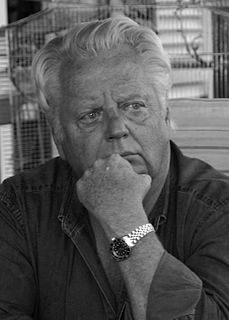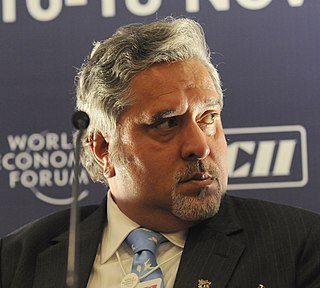Related Research Articles

The term "white-collar crime" refers to financially motivated, nonviolent or non directly violent crime committed by individuals, businesses and government professionals. It was first defined by the sociologist Edwin Sutherland in 1939 as "a crime committed by a person of respectability and high social status in the course of their occupation". Typical white-collar crimes could include wage theft, fraud, bribery, Ponzi schemes, insider trading, labor racketeering, embezzlement, cybercrime, copyright infringement, money laundering, identity theft, and forgery. White-collar crime overlaps with corporate crime.
Martin R. "Marty" Frankel is an American financial criminal who conducted a series of investment frauds in the late 20th century, causing hundreds of millions of dollars in losses. He was caught in 1999, and in 2004 was sentenced to 200 months in prison based on over $200 million in proven losses to insurance companies he bought then looted their actuarial reserves; the sentence was reaffirmed in 2006.
Robert Lee Vesco was an American criminal financier. After several years of risky investments and dubious credit dealings, Vesco was alleged to have committed securities fraud. He immediately fled the ensuing U.S. Securities and Exchange Commission investigation by living in a number of Central American and Caribbean countries.
Guarantee Security Life Insurance Company, or GSLIC, represented one of the most severe cases of insurance fraud in Florida history. According to the Florida Insurance Commissioner:
[GSLIC] was, almost from the beginning, a massive fraud, aided and abetted by blue-ribbon brokers and licensed professionals motivated by their own self-interest. The fraud at Guaranteed Security was a carefully orchestrated bank robbery. But the thieves disguised themselves with the help of accountants and brokers and lawyers rather than wearing silk-stocking masks.
Franz Seraph Tausend, "Der Goldmacher" was a 20th-century German alchemist, who was able to raise significant funding from senior Nazi Party figures for his project. He was arrested in 1929 and convicted of misappropriation, serving a prison sentence. He died in prison in 1942, while serving a sentence for a separate crime.
Great-West Lifeco Inc. is a Canadian insurance-centered financial holding company that operates in North America, Europe and Asia through five wholly owned, regionally focused subsidiaries. Many of the companies it has indirect control over are part of its largest subsidiary, The Canada Life Assurance Company; the others are managed by Great-West Lifeco U.S. LLC, a U.S. based subsidiary. Great-West Lifeco is indirectly controlled by Montreal billionaire Paul Desmarais through his stake in the Power Corporation of Canada, which owns 72% of Great-West Lifeco. The hyphen in the company's name was originally a typesetter's error.

Sholam Weiss is a convicted fraudster.
Richard Pryde Boggs was a Californian neurologist who was sentenced to life in prison in 1990 for his part in a scheme that involved murdering a man and giving the victim another man's identity in order to collect on a $1.5 million life insurance policy.
Philip Abramo, also known as "The King of Wall Street" and "Lou Metzer", is a caporegime in the New Jersey DeCavalcante crime family who was allegedly involved in security fraud and murder. He is the capo of the DeCavalcante family's crew in Miami, Florida, United States.

Thor Halvorssen Hellum was a Venezuelan-Norwegian businessman who served as CEO and President of the Venezuelan state-owned telephone company, CANTV and later as Special Commissioner for International Narcotic Affairs in the administration of President Carlos Andrés Pérez. In this post he held the rank of Ambassador. While investigating links to money laundering and drug trafficking, he was imprisoned on charges of terrorism; he was beaten and mistreated in prison, but later found innocent of all charges. Halvorssen's case was taken up by Amnesty International and several other international human rights organizations. The set-up of Halvorssen was reportedly payback for his investigations into presidential corruption, mafia activity, and the money laundering activities of Colombian drug kingpin Pablo Escobar.
Patricia Combs Fawsett is a Senior United States District Judge of the United States District Court for the Middle District of Florida.
The redemption movement is a debt-resistance movement and fraud scheme which is primarily active in the United States and Canada. Participants allege that a secret fund is created for every citizen at birth, and that a procedure exists to "redeem" or reclaim this fund to pay bills. Common redemption schemes include acceptance for value (A4V), Treasury Direct Accounts (TDA) and secured party creditor kits. Such tactics are sometimes called "money for nothing" schemes, as their aim is ultimately to extract money from the government by using secret methods.
National Westminster Bank, commonly known as NatWest, is a major retail and commercial bank in the United Kingdom based in London, England. It was established in 1968 by the merger of National Provincial Bank and Westminster Bank. In 2000, it became part of The Royal Bank of Scotland Group, which was re-named NatWest Group in 2020. Following ringfencing of the group's core domestic business, the bank became a direct subsidiary of NatWest Holdings; NatWest Markets comprises the non-ringfenced investment banking arm. The British government currently owns around 48.1%, previously 54.7% of NatWest Group after spending 45 billion pounds bailing out the lender in 2008.
Thomas Joseph Petters is a former American businessman and chairman and CEO of Petters Group Worldwide, a company which stole over $2 billion in a Ponzi scheme. He was convicted of massive business fraud in 2009 and is now imprisoned at the United States Penitentiary, Leavenworth. Amid mounting criminal investigations, Petters resigned as his company's CEO on September 29, 2008. He was convicted of numerous federal crimes for operating Petters Group Worldwide as a $3.65 billion Ponzi scheme and received a 50-year federal sentence.

Vijay Vittal Mallya is an Indian businessman, former politician and fugitive. He is the subject of an extradition effort by the Indian Government to return him from the UK to face charges of financial crimes in India.
Scores is a strip club in New York City. In its early years, it was known for its celebrity clientele, which included Howard Stern, Russell Crowe and Jason Giambi. At its peak, it operated in two locations in Manhattan and licensed its name to strip clubs in five other cities. The club has been beset by legal problems over the years, which have included ties to organized crime, tax evasion by its top executives, and club-sanctioned prostitution.
Lowell McAfee Birrell was one of the biggest stock manipulators in the 1950s. He fled the United States to Brazil, but eventually returned and served time in prison for securities fraud.
Mutual Benefits Corporation was a Ft. Lauderdale, Florida based investment sales company that operated a huge ponzi scheme selling viatical settlements, with investors losing an estimated $835 million. The principal ring leader of the scam was Joel Steinger.
References
- ↑ "Met Life Assumes 25,000 Policies And Contracts". The New York Times. 4 July 1996.
- 1 2 3 4 5 6 7 8 "Anatomy of Failure" (PDF). Best's Review. September 2000. Archived from the original (PDF) on 2006-03-23.
- ↑ "FORMER NATIONAL HERITAGE OFFICER, OTHERS CHARGED IN ASSET FRAUD". Business Insurance. 3 August 1997.
- 1 2 3 "Testimony of Dennis Lormel, Section Chief, Financial Crimes, Before the House Financial Services Committee, March 6, 2001". FBI. 2001-03-06. Archived from the original on May 12, 2009. Retrieved 2009-07-02.
- 1 2 3 4 5 6 Rashbaum, William K. (9 March 2000). "845 Years in Prison, If the Authorities Can Catch Him; F.B.I. Says Fugitive Has a Flair For Fraud and Hiding Stolen Cash". The New York Times. Retrieved 30 January 2021.
- 1 2 "National heritage fugitive awaits extradition in Vienna". Best's Review. 101 (8): 17. December 2000.
- ↑ Susan Clary, Orlando Sentinel, 2000 "Insurance Crooks To Serve Life - Plus"
- 1 2 3 Rashbaum, William K. (26 October 2000). "Fugitive Arrested in Austria After a Year on the Run". The New York Times.
- ↑ Susan Clary (October 26, 2000). "Extravagant Fugitive's Run Comes to An End". Orlando Sentinel.
- ↑ Chris McKenna (July 1, 2002). "Convicted thief paid for religious school". Times Herald-Record. Middletown, NY.
- ↑ "Leadership and Life Insurance Failures" (PDF). Actuaries Institute: 8–15. 2013.
- ↑ "Why do insurance companies fail?". GR Global RE-insurance. 2003.
- ↑ Whitney, Sally (September 2000). "Anatomy of a Failure". Best's Review. p. 100. Archived from the original on March 23, 2006. Retrieved February 14, 2018.
- ↑ Whitney, Sally (1 September 2000). "Anatomy of a Failure". Best's Review. pp. 96–99. Archived from the original on 23 March 2006.
{{cite news}}: CS1 maint: bot: original URL status unknown (link) - ↑ Schulte, Fred (26 January 2021). "Trump's pardons included health execs behind massive Medicare frauds". Chicago Sun-Times. Kaiser Health News. Retrieved 27 January 2021.